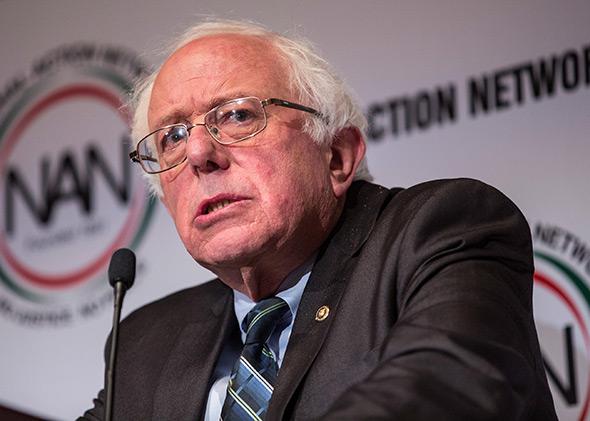When Vermont Sen. Bernie Sanders jumped into the 2016 presidential race, he was widely hailed as a far-left socialist who would appeal to the liberal wing of the Democratic Party. A liberal challenge to Hillary Clinton, said Politico. True progressives’ liberal alternative, trumpeted FiveThirtyEight. But before liberal Democrats flock to Sanders, they should remember that the Vermont senator stands firmly to Clinton’s right on one issue of overwhelming importance to the Democratic base: gun control. During his time in Congress, Sanders opposed several moderate gun control bills. He also supported the most odious NRA–backed law in recent memory—one that may block Sandy Hook families from winning a lawsuit against the manufacturer of the gun used to massacre their children.
Sanders, an economic populist and middle-class pugilist, doesn’t talk much about guns on the campaign trail. But his voting record paints the picture of a legislator who is both skeptical of gun control and invested in the interests of gun owners—and manufacturers. In 1993, then-Rep. Sanders voted against the Brady Act, which mandated federal background checks for gun purchasers and restricted felons’ access to firearms. As a senator, Sanders supported bills to allow firearms in checked bags on Amtrak trains and block funding to any foreign aid organization that registered or taxed Americans’ guns. Sanders is dubious that gun control could help prevent gun violence, telling one interviewer after Sandy Hook that “if you passed the strongest gun control legislation tomorrow, I don’t think it will have a profound effect on the tragedies we have seen.” (He has since endorsed some modest gun control measures.)
None of these views are particularly shocking for a Vermont representative: Sanders’ deep-blue state has both high gun ownership and incredibly lax gun laws, and it’s perfectly logical for the senator to support his constituents’ firearms enthusiasm. And a close friend of Sanders once said that the senator “thinks there’s an elitism in the anti-gun movement.”
But Sanders’ vote for a different kind of pro-gun bill is more puzzling—and profoundly disturbing. In 2005, a Republican-dominated Congress passed the Protection of Lawful Commerce in Arms Act (PLCAA). This law doesn’t protect gun owners; it protects gun manufacturers, distributors, dealers, and importers. The PLCAA was the No. 1 legislative priority of the National Rifle Association for years, because it shields gun makers and dealers from most liability when their firearms are used criminally. It is one of the most noxious pieces of pro-gun legislation ever passed. And Bernie Sanders voted for it. (Sanders’ campaign has not replied to a request for comment.)
Because the PLCAA deals with tort law—not a topic of great interest for most Americans—it didn’t stir much outrage when first passed. But the act’s primary purpose is as simple as it is cold-blooded. Every state imposes liability on manufacturers who are negligent in their production and sale of products. If I crash my Prius because its accelerator malfunctions, I can sue Toyota for negligently manufacturing a faulty pedal. If my child dismembers himself with a blender at Sears, I can sue Sears for negligently leaving that blender within a child’s reach. If I get stabbed by a teenager with a switchblade, I might be able to sue the pawn shop owner who illegally sold a knife to a minor.
Before the PLCAA, most states imposed some form of tort liability on gun makers and sellers. If a gun manufacturer made an assault rifle that could slaughter dozens of people in a few seconds, for instance, one of its victims might sue the company for negligently making a gun that could foreseeably be used for mass murder. If a gun seller sold a gun to a customer without performing any kind of background check—and then the buyer opened fire on the subway—his victims might sue that seller for negligently providing a gun to a mentally unstable person. The standards in each state differed, but the bottom line remained the same: Victims of gun violence and their families could recover financially from the people and companies who negligently enabled gun violence.
The PLCAA changed all that. Remarkably, the act wiped out gun liability laws in all 50 states, rendering them invalid except for a handful of narrow exceptions. (So much for states’ rights.) Thanks to the law, victims of mass shootings are barred from suing the companies that produced a wartime weapon that no civilian could ever need. With few exceptions, victims cannot sue a gun seller for negligently providing a semiautomatic weapon to a lunatic who shoots them in a movie theater. Even if a jury decides a gun maker or seller should be liable, the PLCAA invalidates its verdict. The law tramples upon states’ rights, juries’ rights, and fundamental precepts of America’s civil justice system. And it received Bernie Sanders’ support—in both 2003 (when it was first introduced) and 2005 (when it finally passed).
Every few years, the families of mass shooting victims take gun makers to court for creating a weapon seemingly designed to kill as many people as possible in as short a time as possible. Every time, they run headfirst into the PLCAA. Right now, the families of Sandy Hook victims are searching for a loophole in the law, so they can sue Bushmaster for making the gun that sent 154 bullets through 20 children and six adults in 264 seconds. They will probably fail.
Several liberal congressional representatives have recently spoken out against the PLCAA, and if Democrats retake both houses of Congress, they may make repealing the law a priority. Hillary Clinton, who voted against the act as a senator, would almost certainly sign a repeal bill. Would a President Bernie Sanders? Until he says otherwise, we have every reason to believe the ostensible progressive hero would stand behind the vile legislation he championed just a decade ago.
